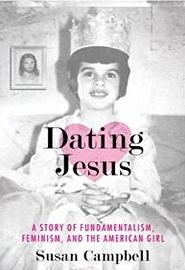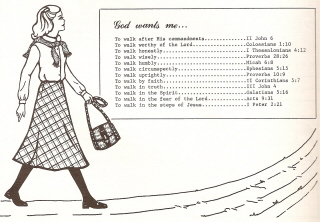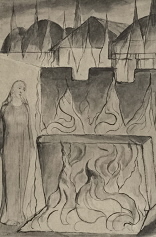Today’s Christian Charm School lesson brings us to the crucial spiritual principle of posture. Evidently, saints know not to swing their arms and hips too wildly while walking.

Don't walk like an Egyptian.
Maybe the Pope and the Dalai Lama will be covering this soon as well, but for now, the Charm Marm is the only guide we have who points out the scriptural importance of walking properly.
On page 18 of the Christian Charm Manual, the sweet girlies in class are shown the above illustration with instructions to “glide smoothly” and “keep stride moderate” and to not “swish knees noisily,” “drop heels with a thud” or “sway hips unnecessarily” when walking.
One the opposite page, the metaphor of “walking after the flesh” is presented with scriptures such as, “Let me not forget I am not my own” (I Corinthians) and “May I not grieve Thy Holy Spirit in the slightest way today—not once!” (The Charm Marm actually combined two verses from Ephesians and Ecclesiastes for that last one.)
So here we are again, chickadees, learning that the slightest thing we do incorrectly may grieve the Holy Spirit. Even the gods of ancient Greece weren’t this easily offended. It’s hard to imagine taking this line of thinking seriously:
- Walk gracefully. Jesus likes it that way! (Hmm, was he gliding smoothly under the weight of that cross?)
- Don’t swish your knees when you walk. Jesus doesn’t like it that way! (Did he walk quietly into the temple before throwing out the money changers?)
This level of detail seems silly, as always. But it gets at the fundamentalist need for control. Those of us immersed in that way of thinking as youngsters absorb all kinds of subconscious patterns that make us feel a very strange thing indeed: the need to control and be controlled simultaneously.
We learn that we aren’t masters of our own fate, but rather should be content with whatever rolls our way. We call this “God’s will” and use it as a reason for not making our own decisions or taking responsibility for what we really want.
Yet we also want to control others. We want everyone else to believe exactly as we do, and we plan to wave goodbye as they’re tossed into a literal, fiery hell if they think they’ve found God another way. We want to control the way others perceive truth, and we want to control the way others perceive us (since we’re taught that we’re only worthy when we’re pleasing others).
Undo the Charm Marm:
These patterns run deep. Even if you didn’t grow up thinking Jesus might actually care whether you “drop your heels with a thud” when you walk, the desire for control is transmitted implicitly through more traditional church teachings. It’s easy enough to realize you want to relinquish control of others and take control for yourself, but actually doing it can be tough.
Find some specific point of control you feel and undo it. T.S. Eliot famously asked in The Love Song of J. Alfred Prufrock, “Do I dare disturb the universe?” Let your answer to that be “yes,” even if it means swishing your knees noisily when you walk. Notice that the universe does not unravel when you do so.
Notice, too, that the universe does not implode when you let go of the desire to control others’ perceptions. Nor do you smell brimstone when you state clearly what you want instead standing by passively. And while you’re thinking that over, be sure to swing your hips a little.










